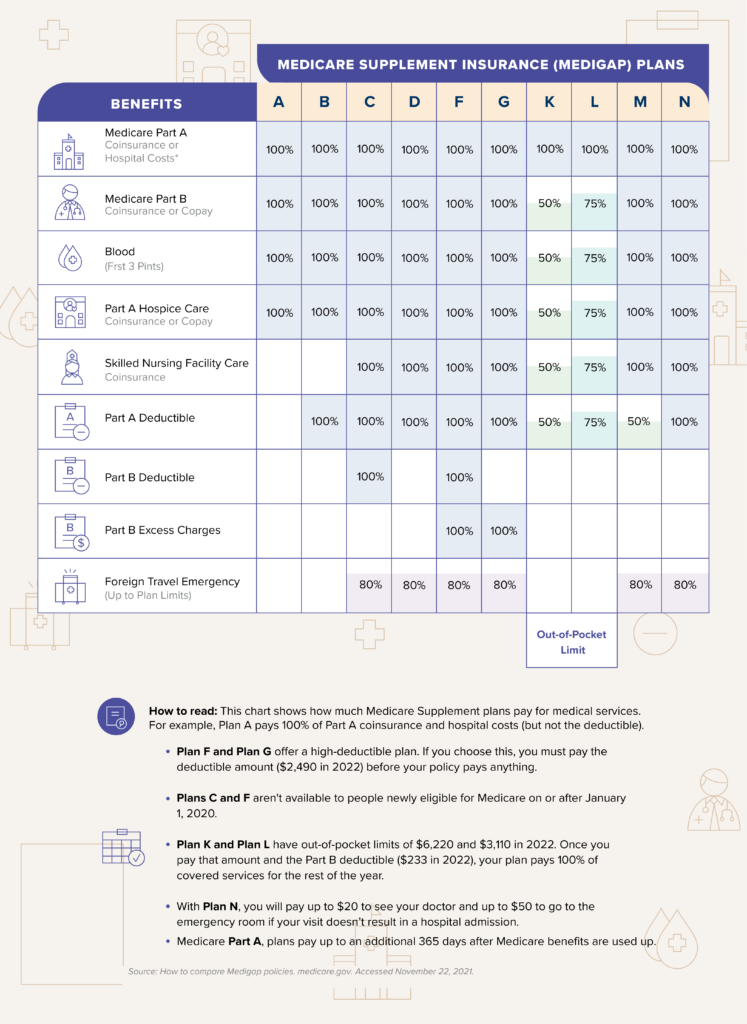Medicare provides federal health insurance coverage for people age 65 and up, or those with certain disabilities.1 But there are some things Medicare doesn’t cover, which is where Medicare Supplement Insurance plans, or Medigap policies, come in. As of 2019, about 14 million Medicare enrollees owned Medigap policies.2 New Jersey is one of the top 20 states in Medigap policyholders, with over 491,000 in 2019.3
What Is Medicare?
Original Medicare has two parts: A and B. Part A covers inpatient hospital care, care in a nursing facility, hospice care and some home health care. Part B covers outpatient care, doctor visits and prescribed medical equipment. Medicare doesn’t cover most prescription drugs. For drug coverage, you need to sign up for a separate Medicare Part D plan. Generally, you must have Medicare Part A and B to have a Medigap policy.
Original Medicare doesn’t cover 100% of approved costs for care, and there isn’t an annual cap on how much you might have to pay. Medicare Supplement plans cover the “gaps” in Original Medicare. The amount of supplemental coverage varies by plan. Plan G, for instance, covers nearly all gaps. Other plans leave you to pay more out-of-pocket.
What You Need to Know
Medigap policies can help you control your medical costs by covering the “gaps” in Original Medicare coverage.
Some Medigap policies offer more comprehensive coverage, so you pay very little out-of-pocket. Other policies provide less coverage, but also cost less per month.
In New Jersey, it is wise to choose Medigap plans during your initial Open Enrollment Period since you are not guaranteed a plan later on.
When Can You Enroll in Medigap?
Open Enrollment Period
In New Jersey, you can apply during the six-month Medigap Open Enrollment Period (OEP), which begins when you turn 65 and qualify for Medicare Part B. If you’re under 65 but disabled, your OEP also begins when you enroll in Part B.4 Decide which Medigap policy you want and contact the insurance company to begin the process. During the OEP, you can’t be denied coverage or charged a higher premium because of your medical history.5
Several insurers offer Medigap policies in New Jersey for those with disabilities age 50-64.6 Only one insurer in New Jersey offers Medigap coverage for people under 50.7
Outside the Open Enrollment Period
If you’re outside the OEP, you might face a penalty or pay more for coverage. New Jersey doesn’t offer guaranteed issue rights throughout the year. This means an insurer can deny you coverage if you have preexisting conditions or other health issues. They can also charge you a higher premium based on your health.8 Special Enrollment Period
During a Special Enrollment Period (SEP), you can make changes to your coverage without facing a penalty.9 SEPs include the following:
- You leave an employer health plan or COBRA plan
- You move to a new address that isn’t in your plan’s service area
- You dropped a Medigap policy for the first time to join a Medicare Advantage plan
What Are the Most Popular Medicare Supplement Plans?
There are 10 Medicare Supplement plans (A, B, C, D, F, G, K, L, M, N) available to those who turned 65 before the year 2020. In 2020, Plan C and Plan F aren’t available to those newly eligible for Medicare.10
Plans F and G are popular choices because they’re more comprehensive. Under these plans, you won’t pay anything out-of-pocket for most services covered by Medicare — including hospitalizations and surgeries.
Plan F was the clear top choice for members, covering 49% of policyholders in 2019. The second most popular was Plan G, at 22%, and Plan N at 10%. Plans F, G and N made up 81% of total Medigap enrollment that year.11
Plan F
Plan F covers 100% of the gaps in Medicare Part A and B, including coinsurance and copayments for services.
Plan G
Plan G covers everything Plan F covers except for the $233 Part B deductible.
Plan N
Plan N covers the Medicare Part A deductible, but not the Part B deductible. It includes cost-sharing for certain doctor and hospital visits. It isn’t as comprehensive as the other plans, but it also costs less per month.
How Do You Choose a Medicare Supplement Plan?
Compare what’s available so you can pick the right plan for you. Here are some things to consider:
- Are you likely to have a lot of health needs, because of preexisting conditions or other issues?
- What kind of budget do you have for monthly healthcare costs?
- Do you expect to have a lot of out-of-pocket costs for health services?
How Much Do Medigap Policies Cost in New Jersey?
Below are the preferred rates, or the rates offered to lower-risk applicants, for Medigap in New Jersey in 2021. 12
| Female | Age 65 | Age 75 |
| Plan F | $150-$406 | $184-$428 |
| Plan G | $121-$395 | $158-$395 |
| Plan N | $96-$303 | $128-$303 |
| Male | Age 65 | Age 75 |
| Plan F | $166-$466 | $212-$475 |
| Plan G | $128-$454 | $179-$454 |
| Plan N | $96-$349 | $147-$349 |
Rates outside the OEP will likely be higher.
What If You Want to Change Your Medigap Policy?
If you want a plan with more coverage, or you want to lower your costs, you can switch policies. But you can only do this during your OEP, or under special enrollment circumstances. Your insurance company can help you through the process. After you get the new policy, you’ll have 30 days to decide whether to keep it. You’ll have to pay both premiums for that month, though.13
What Are the Alternatives to Medigap?
Instead of Original Medicare plus a Medigap policy, you could choose a Medicare Advantage plan.
Medicare Advantage (Part C) plans are typically HMO or PPO plans that include prescription drug coverage. They work like private insurance, with copays and an annual cap on out-of-pocket expenses. But you’d likely be limited to the providers in your network.
Medicare Advantage plan offerings vary across New Jersey. There are 36 Medicare Advantage plans available in Montclair from eight insurers. There are 38 plans available in Princeton from nine insurers.14
What Are Medicare Resources in New Jersey?
State Health Insurance Assistance Program (SHIP): 800-792-8820
NJ State Department of Banking & Insurance – Health Insurance Programs
NJ Save: For lower-income seniors and those with disabilities
NJ Medicaid: For low-income families, those with disabilities or pregnant women; 800-356-1561
Next Steps
Medigap policies in New Jersey can help you manage your healthcare costs through Original Medicare, saving you paperwork and worry. Since these policies vary in what and how much they cover, you should decide what your needs are before you pick a plan.
Snippet Render Is Present – D3 cannot be loaded in editor mode. Go to preview or publish mode.



